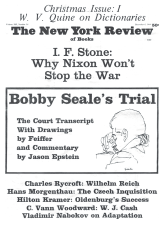In response to:
Dangerous Acquaintances from the October 9, 1969 issue
To the Editors:
Mr. Barzini’s article “The Sicilians” (NYR, October 9) struck me as excessively shallow and misleading. It gave me the impression that the writer is more concerned with being clever than with being accurate. Particularly offensive is the portrait he presents of Danilo Dolci, which is so distorted as to smack of slander. It is certainly a gross misrepresentation to say of Dolci that he is “not a social reformer” but “an unconscious and extremely able manipulator of publicity.” To make such a statement is to deny the impressive and solid work that Danilo Dolci and his collaborators have gradually accomplished in Western Sicily during the past fifteen years.
Part of that work consists of Dolci’s aggressive crusade against the Sicilian Mafia. Although Mr. Barzini discusses the Mafia at some length, he pays no attention to Dolci’s anti-Mafia activities, which culminated in his arrest, on charges of “criminal libel,” for exposing the close connections between a prominent Christian Democrat senator and a number of well-known mafiosi. It is difficult to understand how Mr. Barzini could have ignored the long and unjust trial that ensued (1965-67) since nearly half of The Man Who Plays Alone (the book that Mr. Barzini was purportedly reviewing) is devoted to the subject.
By saying nothing of the trial, in which Dolci and his associate Franco Alasia were found guilty, the reviewer, consciously or unconsciously, was playing the game of the Christian Democrats who used every possible technique to keep the public in the dark about its proceedings, even to the extent of holding its sessions at odd and unexpected hours, so as to discourage newspaper coverage. It seems to me that Mr. Barzini also plays the game of the political establishment when he tries to diminish Dolci’s significance by describing him as “a mad non Catholic saint of today.” That statement is so patently false as to make me question the validity of all the other judgments expressed in the article.
Jerre Mangione
University of Pennsylvania
Philadelphia
P.S. Dolci and Alasia appealed the verdict of the court, which imposed a suspended jail sentence, and heavy fines. A new trial is expected shortly.
J.M.
This Issue
December 4, 1969



